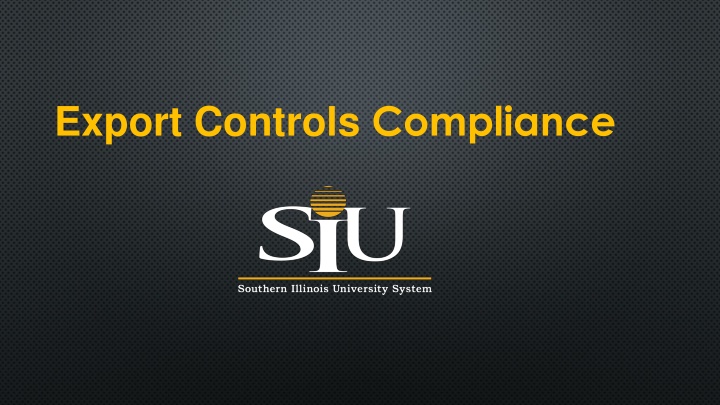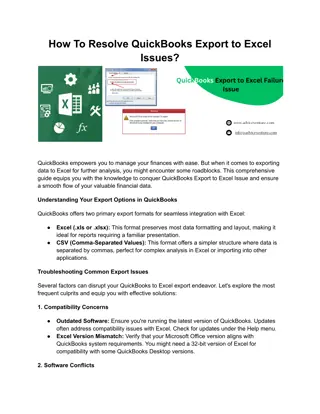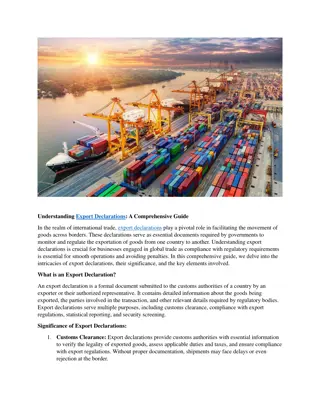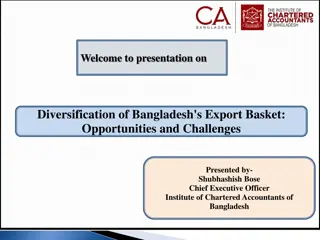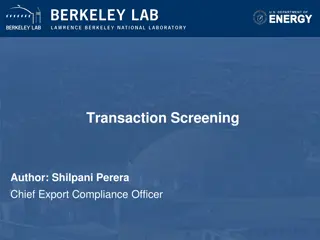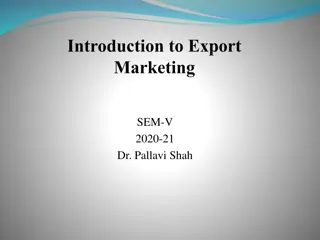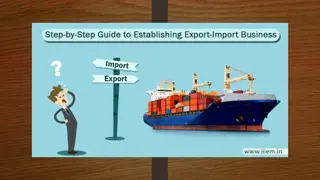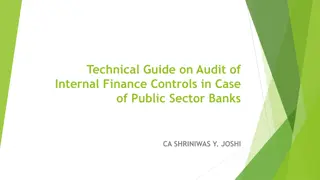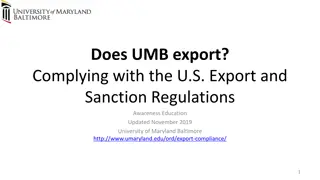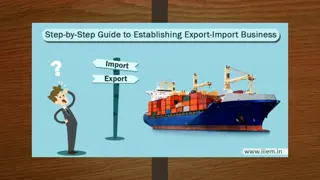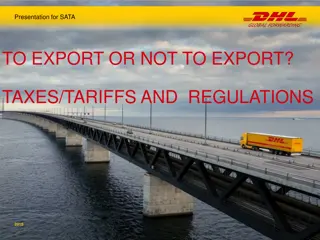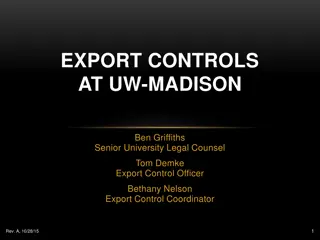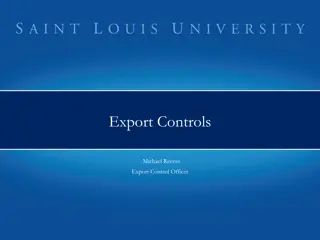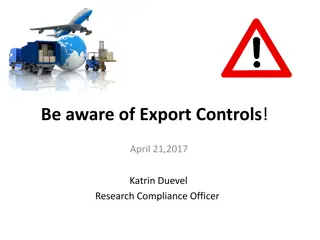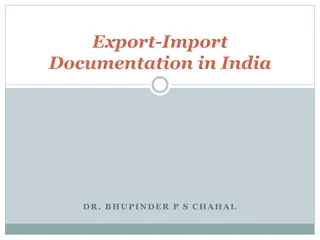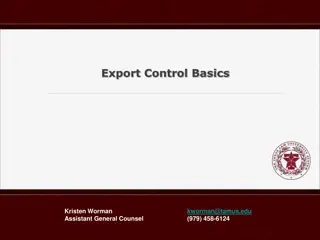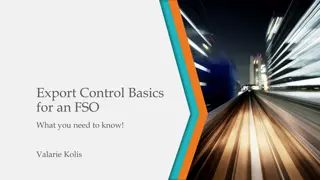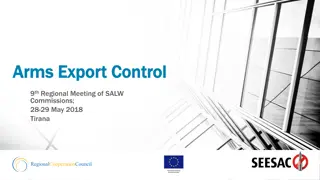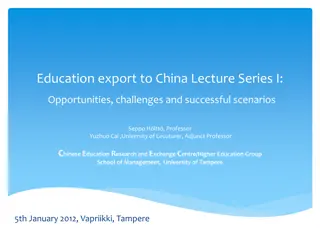Export Controls Compliance
Learn about the intent of export control laws, penalties for noncompliance, when export controls may apply to research, and exemptions for university research. Understand the significance of complying with export regulations to prevent proliferation of weapons of mass destruction, terrorism, and ensure national security.
Download Presentation

Please find below an Image/Link to download the presentation.
The content on the website is provided AS IS for your information and personal use only. It may not be sold, licensed, or shared on other websites without obtaining consent from the author.If you encounter any issues during the download, it is possible that the publisher has removed the file from their server.
You are allowed to download the files provided on this website for personal or commercial use, subject to the condition that they are used lawfully. All files are the property of their respective owners.
The content on the website is provided AS IS for your information and personal use only. It may not be sold, licensed, or shared on other websites without obtaining consent from the author.
E N D
Presentation Transcript
WHAT IS THE INTENT OF THE EXPORT CONTROL LAWS? Restrict exports of goods and technology that could contribute to the military potential of adversaries Prevent proliferation of weapons of mass destruction (nuclear, biological, chemical) Prevent terrorism Comply with U.S. trade agreements and trade sanctions against other nations
PENALTIES FOR NONCOMPLIANCE ITAR Criminal: up to $1M per violation and up to 10 years in prison Civil: seizure and forfeiture of articles, revocation of exporting privileges, fines of up to $500K per violation EAR Criminal: $50K-$1M or five times value of export, whichever is greater, per violation, up to 10 years in prison Civil: loss of export privileges, fines $10K-$120K per violation OFAC Criminal: Up to $1M and 10 years in jail Civil: $12,000-$55,000 per instance Loss of Export Privileges/Federal Research Funding
WHEN EXPORT CONTROLS MAY APPLY TO RESEARCH The following list of questions is designed to help you determine if Export Controls may apply to your research: 1. Does the research involve military, weapons, defense, chemical or biological weapons, encryption technology & software, space or other dual-use items or export restricted technologies? 2. Does the research involve collaboration with foreign colleagues (including graduate students) either here at SIU/SIUE or abroad? 3. Does the research involve the transfer or shipment of equipment, materials or funding out of the U.S.?
WHEN EXPORT CONTROLS MAY APPLY TO RESEARCH (continued) 4. Does any part of the research take place outside of the U.S. (e.g. field work)? 5. Are there any contractual restrictions on publication or access to or dissemination of the research results? 6. Does the research involve the shipment or transfer of materials, money or any other type of collaboration with foreign nationals from a sanctioned or embargoed country (i.e. Cuba, Iran, North Korea, Sudan, or Syria)?
EXPORT CONTROLS & UNIVERSITY RESEARCH The good news: The vast majority of research conducted at U.S. universities is exempt from export controls under three exclusions provided for under the current regulations: The Fundamental Research Exclusion The Educational Information Exclusion The Public Information Exclusion
THE FUNDAMENTAL RESEARCH EXCLUSION For research to qualify as Fundamental Research, all of the following must be true: There can be no restrictions on publication There can be no access or dissemination restrictions The research must take place at an accredited institution in the U.S. Delays in finalizing sponsored research agreements can be encountered when sponsors try to insert publication or access restrictions in agreements which would nullify the Fundamental Research Exclusion.
EXPORT CONTROL RELATED ACTIVITIES It is critical to note that many normal, everyday University activities are subject to Export Controls, including: Shipping or carrying items to another country Traveling overseas on University business (e.g., conferences, conducting field work, international symposia) Collaborations with foreign nationals (here or abroad) Involvement with an embargoed or sanctioned country Use of military or dual-use equipment (i.e. spectrometers, fermenters, thermal cameras) International Visitors
INTERNATIONAL VISITORS ALL international visitors to campus should be screened and cleared prior to their visit. Some international visitors, such as visiting scholars, go through a formal process, in which restricted party screening is performed. When planning for international visitors that are not going through a formal process, contact the Center for International Education to coordinate the visit so that the individuals can be screened.
SIU CLEAN LAPTOP PROGRAM All SIU System employees, SIUE faculty and staff, SIUC faculty and staff, SIU School of Medicine faculty and staff that travel to the designated foreign countries. All SIU travel to the below countries WILL REQUIRE that an Informational Technology Services clean laptop be used during SIU business travel to those countries. Your SIU issued laptop computer SHALL NOT be transported to any of the below countries. IRAN CUBA SYRIA BELARUS CAMBODIA SUDAN CHINA VENEZUELA NORTH KOREA RUSSIA UKRAINE (Crimea Region)
FOREIGN TALENT RECRUITMENT PROGRAM (FTRP) Foreign Talent Recruitment Program (FTRP) An effort directly or indirectly organized, managed, or funded by a foreign government, including state-owned enterprises, or a foreign institution to recruit science and technology professionals or students (regardless of citizenship or national origin, and whether having a full-time or part-time position). Covered Individual Individual who contributes in a substantive, meaningful way to the scientific development or execution of a research and development proposal proposed to be carried out with a research and development award from a Federal research agency and is designated by the Federal research agency as a covered individual (currently interpreted to mean all PIs and senior/key personnel)
MALIGN FOREIGN TALENT RECRUITMENT PROGRAM Any program, position, or activity that includes compensation in the form of: cash in-kind compensation research funding promised future compensation complimentary foreign travel things of non de minimis value honorific titles career advancement opportunities other types of remuneration or consideration AND is directly provided to a targeted individual by a foreign country at any level (national, provincial, or local) or their designee, or an entity based in, funded by, or affiliated with a foreign country, whether or not directly sponsored by the foreign country and whether directly or indirectly stated in the arrangement, contract, or other documentation at issue AND is sponsored by: a country or entity based in a county of concern (China, North Korea, Russia, Iran) OR academic institutions OR foreign talent recruitment programs on the list under section 1286(c)(8) of the John S. McCain National Defense Authorization Act for Fiscal Year 2019 AND in exchange for the individual engaging in one or more of the following behaviors (see next slide)
CHARACTERISTICS OF MALIGN FTRPS Engaging in unauthorized transfer of intellectual property, materials, data products, or other non-public information Being unable to terminate involvement in the foreign talent recruitment program except in exceptional circumstances Obligation to recruit, enroll, or hire trainees or researchers for such programs, positions, or activity Establishing a lab or company, accepting a faculty position, or undertaking any other employment or appointment in a foreign country or affiliated with a foreign country IF such activities are in violation of the terms of a federal award Being limited in the capacity to carry out an award or required to engage in work that would result in substantial overlap or duplications with a federal award Being required to apply and successfully receive funding from the sponsoring foreign government s funding agencies with the sponsoring foreign organization as the recipient Being required to omit acknowledgement of the recipient institution with which the individual is affiliated, or the federal agency sponsoring the award, contrary to University policies or terms and conditions of the federal award Being required to not disclose to the Federal agency or employing institution the participation in the program, position, or activity Having a conflict of interest or conflict of commitment contrary to the standard terms and conditions of the federal award
WHAT OBLIGATIONS DO RESEARCHERS HAVE? Contact the Export Controls Office before engaging in any international activities Participation in a foreign talent recruitment program DISCLOSE: FCOI, federal forms (Current and Pending/Other Support, and/or on Biosketch) Participation in a malign foreign talent recruitment program DISENGAGE NOW (if involved with one) You will not be able to receive or apply for federal funding if you are engaged with a malign foreign talent recruitment program. AVOID DISCLOSE: FCOI, federal forms (Current and Pending/Other Support, and/or on Biosketch)
SUMMARY Contact the Export Controls Office for any international University activities, including, but not limited to: Shipping or carrying items out of the country Travel to a foreign country Online interactions to another country Collaborations/research with a non-US citizen or a person located in another country Use of chemicals, biologicals, military or dual-use items Participation or offers to participate in a foreign talent recruitment program
EXPORT CONTROLS CONTACT INFORMATION SIUE Todd Wakeland Director of Export Controls 3311 Rendleman Hall Box 1259 Edwardsville, IL 62026 618-650-2476 twakela@siue.edu SIUC Brenda Martin Export Control Officer 363 Woody Hall Mail Code 4344 Carbondale, IL 62901 618-453-2308 bjmartin@siu.edu exportcontrols@siu.edu Export Controls Website https://siusystem.edu/academic-affairs/export-controls/index.shtml
